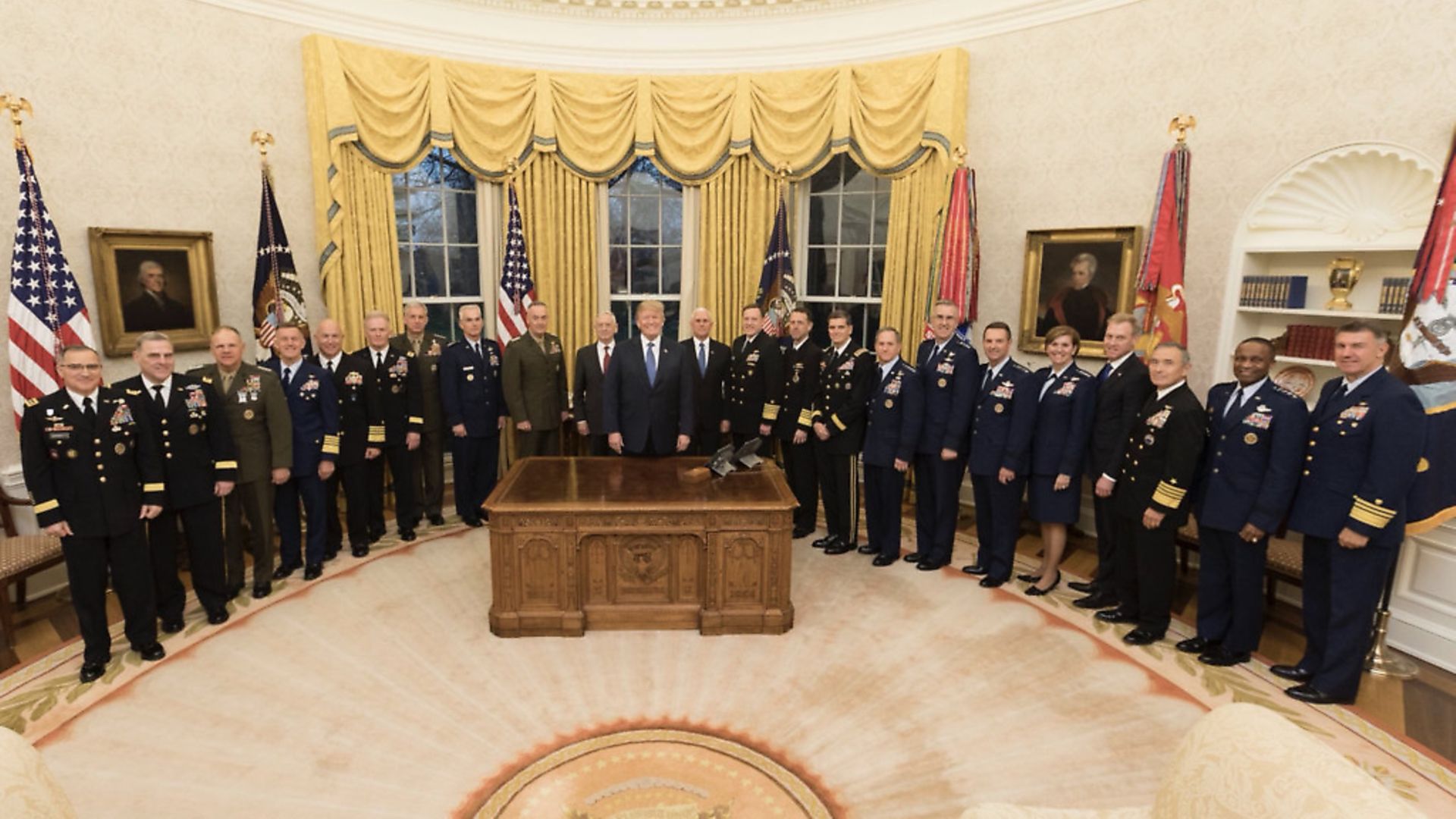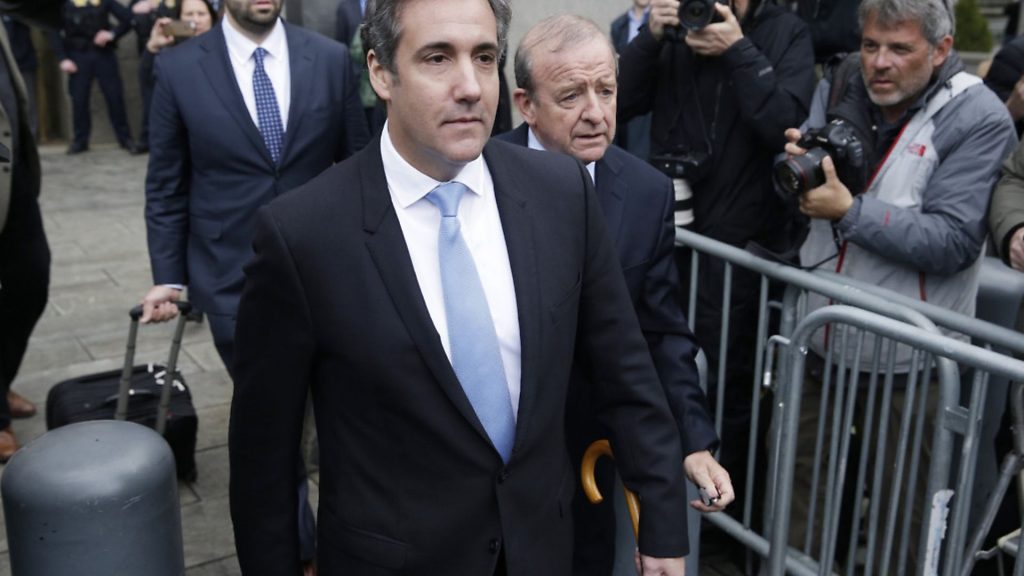
Paul Connew writes a special report on the chaos within Trump’s United States

Let’s start by saluting US Defence Secretary General Jim Mattis. ‘Mad Dog’ by nickname, but anything but mad dog in reality. It was Mattis who reined back a Twitter-barking, ranting president and insisted on measured surgical strikes against the Assad regime’s chemical weapons sites. It was Mattis who insisted on using military back-channels to alert Moscow in advance and make sure no Russian forces became collateral damage despite Donald Trump’s blood-curdling Twitter frenzy. It was Mattis who, at one tense point, apparently told a gung-ho Trump than he wasn’t going to be party to starting a third world war.
By all accounts, Mattis and other Pentagon chiefs were genuinely concerned about the president’s mental state in handling the Syrian strategy because of his obsession with his escalating domestic crises, and feared that he risked overseas overkill with his well-established penchant for diversionary, news-agenda switching tactics when under pressure.
That somewhat absurd PR photocall shot Trump tweeted three days ahead of the Syria strike, showing himself ostentatiously lined up in the Oval Office alongside 19 of his be-medalled military top brass – including Mattis – after a White House dinner didn’t tell the real story.
All week, the generals had been seriously alarmed by Trump’s preamble to discussing the military options, consisting of a lengthy rant about Special Counsel Robert Mueller’s Russian Connection investigation, former FBI director James Comey’s upcoming book and television interview and the FBI’s raid on the offices and home of the president’s New York lawyer Michael Cohen. The words ‘witch hunt’ too often became the ‘verbal missile flying around the room’, according to one military eyewitness who confided that the president ‘appeared more than a little paranoid at times’.

Paranoia well-founded, perhaps? For this is the week when – despite the ‘diversion’ of dealing with Assad’s chemical atrocities – Trump’s desperate determination for firing off Twitter rockets at his perceived domestic enemies reflected his fear that impeachment and even a prison cell could be looming closer on the horizon.
The twin threats of Mueller’s investigation and the FBI swoop on his long-standing lawyer are starting to look far more politically and forensically toxic for the president of the United States than anything Syria’s brutal tyrant has left in his chemical arsenal.
Even before Comey’s much-trumpeted interview with ABC, the president was tweeting ‘LEAKER & LIAR’ barbs, branding the former FBI chief an ‘untruthful slime ball’ and boasting, ‘It was my great honor to fire James Comey!’. Privately, several senior White House figures confided that they thought Trump was suffering an ’emotional meltdown’.
And, if Trump had hoped his strike at Assad’s chemical capabilities would eclipse the media and public interest in Comey’s tome, A Higher Loyalty, he was swiftly disappointed. Not least when early polls suggested the US public saw the former FBI chief as ‘more believable’ than the president by a 48-32 margin, with a 47-33 majority saying Trump was wrong to sack Comey. Those figures weren’t particularly great for Comey, but they were disastrous for a sitting president and suggested that efforts by the White House and pro-Trump loyalists to depict the ousted FBI director as an ’embittered ex-employee’ and a ‘publicity junkie with a book to sell’ aren’t so far proving particularly effective.
Worse still, GOP private polling increasingly shows more and more Republican voters – apart from among Trump’s hardcore support base – are opposed to and alarmed by mounting prospect of the president firing Mueller, or the man he reports to, Deputy Attorney General Rod Rosenstein. This scenario would then see Rosenstein replaced by a ‘Trump stooge’ who would oust Mueller and close his investigation, or at least radically reduce its scope and scale.
So great is the fear of such a scenario that senior Democrats and moderate Republicans on Capitol Hill have been meeting secretly to discuss reviving Congressional legal moves to block Trump’s power to sack either man. Away from the hard right, pro-Trump ‘Conservative Caucus’ there is an emerging bipartisan acceptance that any attempt to fire the pair would trigger a constitutional crisis with impeachment its logical conclusion, if the president refused to back down.
The sense of crisis on both sides of Capitol Hill increased when Trump used his pardoning powers to pardon Scooter Libby – former Bush administration vice-president Dick Cheney’s chief of staff – who had been convicted on a charge surrounding the leaking of CIA officer Valerie Plame’s secret identity, potentially endangering her life.
Alarmed lawmakers interpreted that as a beleaguered president trying to send out a signal to those in his own circle and his 2016 campaign team now known, or suspected, to be co-operating with Mueller. Congressman Adam Schiff, the senior Democrat on the House Intelligence Committee, reacted to the Libby pardoning ‘red light’ by announcing he’d be working on legislation to outlaw any presidential pardoning power where POTUS himself is a potential witness, subject or potential target for criminal prosecution.
Schiff warned: ‘I think the president is sending a message, basically… I will use the pardon power to pardon people even that have been convicted of leaking, wrongdoing or obstruction of justice. If you’re with me, I have your back.’
For too many on Capitol Hill, Trump’s Libby pardoning carried echoes of Richard Nixon’s attempt to use pardoning powers to head off the Watergate scandal that eventually ended his presidency.
For too many again on Capitol Hill – including GOP election strategists and Trump-sceptic Republican lawmakers – James Comey’s book and his ratings blockbuster television interview amounted to the equivalent of a domestic political Tomahawk cruise missile heading for the White House.
OK, it may have been partly a revenge ego-trip for an embittered Comey and certainly would have played well with his bank manager, his publishers and his book sales, but the damage to the president himself is incalculable. The snide jibes mocking Trump’s hair and orange face may have been cheap shots and hardly in line with Michelle Obama’s famous maxim: ‘When they go low, we go high’. But when a former FBI director appears on millions of TV screens and tells the American people their president is ‘morally unfit’ to sit in the Oval Office, may be compromised by Russia, is a compulsive liar and bigot who talks about and treats women ‘like pieces of meat’ and may well have ‘obstructed justice’ in his bid to shut down the Russian Connection investigation, we’re talking an unprecedented open declaration of war. According to White House aides, Trump only watched ‘bits and pieces’ of the interview. Except that no one familiar with this hyper-sensitive, narcissist TV-obsessed president believed that for a second. Comey and Mueller are far from the flailing president’s only problems, though. Just as Trump jetted on Air Force One to his gaudy Mar-a-Lago estate in Florida – the ‘Sunshine White House’ he much prefers to the real one in Washington – a New York court case was unfolding around the president and his lawyer Michael Cohen that some legal experts believe could prove an even bigger threat to Trump’s presidency than the Mueller investigation.
Judge Kimba Wood rejected a request by Trump’s lawyers to block the FBI from reading documents, tapes and computer files they seized in last week’s raid on Cohen’s office, alleging they expected to find evidence of ‘criminal activity’. Sources suggest that the records seized could include those dealing with business links involving the Trump family empire, and certain associates with Kremlin-linked Russian figures, going back several years and pre-dating Trump’s run for the presidency.
The president’s lawyers are arguing it breaches attorney-client confidentiality and are demanding advance sighting of the seizure. Behind the scenes, Trump’s legal team also suspect Mueller may be on the brink of offering Cohen a plea bargain deal in return for his co-operation.
The flamboyant, cigar-chewing lawyer is the man who admits he paid porn star Stormy Daniels $130,000 hush money out of his own pocket during the election campaign (while claiming he did so without telling Trump) to stop her talking about a sex encounter with the president years before. Stormy (real name Stephanie Clifford) sparked a media sensation when she turned up with her own lawyer for Monday’s New York court hearing. Cohen – who has previously called himself Donald Trump’s ‘fixer guy’ – is also alleged to have brokered another pre-election sex scandal cover-up involving former Playboy model Karen McDougal over her alleged affair with Trump. She was paid $150,000 by America’s notorious National Enquirer scandal magazine for her story – except that the magazine, whose owner David Pecker is a close friend and confidant of Trump’s, didn’t publish it. One of the most dramatic, damaging twists in the New York court hearing came, however, when a reluctant Cohen was forced by the judge to disclose the name of another client who wanted his identity kept secret. It turned out to be Fox News host Sean Hannity, one of the president’s closest confidants, unofficial advisers and private dinner guests at both the White House and Mar-a-Lago. Only days earlier Hannity’s show had been savagely lambasting the FBI raid on Cohen’s office, Mueller’s escalating investigation and Comey’s book and TV appearance while robustly defending the president. Without a mention of his own compromised, conflicted position… an embarrassing omission for Rupert Murdoch’s flagship US channel.
With Trump’s domestic woes mounting, then, and Syria now slipping down the news agenda, the president is in need of fresh foreign distractions. Fortuitously for him, CIA director Mike Pompeo’s secret visit to meet North Korean leader Kim Jong Un suggests another is emerging, in a no less combustible region of the world.









